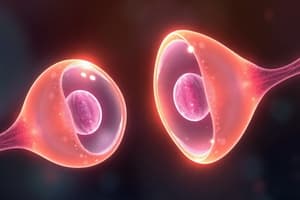Podcast
Questions and Answers
What is the main purpose of sexual reproduction in living beings?
What is the main purpose of sexual reproduction in living beings?
- To speed up the reproduction process
- To create identical offspring
- To reduce genetic variation
- To produce genetically diverse offspring (correct)
Which kingdoms rely on sexual reproduction for creating new individuals?
Which kingdoms rely on sexual reproduction for creating new individuals?
- Monera, Protista, Fungi, and Animalia
- Animalia, Plantae, Fungi, and some protists (correct)
- Plantae, Animalia, Eubacteria, and Archaea
- Plantae, Protista, Eubacteria, and Animalia
What is the role of meiosis in sexual reproduction?
What is the role of meiosis in sexual reproduction?
- To halve the genetic material of parent organisms (correct)
- To duplicate the genetic material of parent organisms
- To increase the chromosome number in offspring
- To skip the recombination of genetic material
What are the specialized cells involved in sexual reproduction known as?
What are the specialized cells involved in sexual reproduction known as?
What is the significance of gametes being haploid?
What is the significance of gametes being haploid?
In animals, what are the male and female gametes called respectively?
In animals, what are the male and female gametes called respectively?
What is the process of fertilization also known as?
What is the process of fertilization also known as?
Where does fertilization usually occur in animals?
Where does fertilization usually occur in animals?
What is the outcome of the fusion of male and female gametes?
What is the outcome of the fusion of male and female gametes?
What important advantage does genetic variation offer to organisms?
What important advantage does genetic variation offer to organisms?
What is the role of sexual reproduction in promoting species survival?
What is the role of sexual reproduction in promoting species survival?
What is a fundamental aspect of life that contributes to the creation of genetically diverse offspring?
What is a fundamental aspect of life that contributes to the creation of genetically diverse offspring?
Flashcards are hidden until you start studying
Study Notes
Reproduction in Living Beings: A Focus on Sexual Reproduction
Sexual reproduction is a fundamental aspect of life, enabling the creation of genetically diverse offspring. This process, shared by organisms across the kingdoms of Animalia, Plantae, Fungi, and some protists, relies on the fusion of two specialized reproductive cells—gametes—to form a new individual. In this exploration of sexual reproduction, we'll delve into various aspects such as the role of meiosis, the importance of genetic variation, and the significance of sexual reproduction in nature.
Meiosis: Halving the Genome
Sexual reproduction originates with meiosis, a specialized cell division process that halves the genetic material of a parent organism. During meiosis, a diploid cell (containing two sets of chromosomes) gives rise to four haploid gametes (with one set of chromosomes each). This halving of the genome allows for the recombination of genetic material, resulting in offspring with unique genetic profiles.
Gametes: Specialization and Production
Gametes are the specific cells or spores involved in sexual reproduction. In animals, gametes are called sperm and eggs, while in plants, they are called pollen grains and ovules. These specialized cells contain only half the genetic material of the parent organism and, in many instances, require fusion with a complementary gamete from another individual to form a new, diploid organism.
Fusion of Gametes: Combining Genetic Material
The process of fertilization, or syngamy, is the fusion of male and female gametes, uniting their genetic material. In animals, sperm cells swim to the female's reproductive tract, where they encounter the egg cell. In plants, pollen grains are transferred to the reproductive structures (flowers or cones) of the female plant, where they germinate and penetrate the ovules.
Fertilization: Creating a Diploid Zygote
During fertilization, the male and female gametes fuse, forming a zygote—a diploid cell that contains the genetic material of both parents. In animals, this process often occurs within the female reproductive tract, while in plants, it occurs within the ovule. The zygote undergoes cell division, eventually developing into an embryo and then a new organism capable of reproducing on its own.
Genetic Variation: Evolutionary Advantages
Sexual reproduction creates offspring with unique genetic profiles, known as genetic variation. This variation allows for natural selection to occur, as organisms with desirable traits are more likely to survive and reproduce. Over time, these advantageous traits become more common in a population, contributing to the evolution of species over generations.
Sexual Reproduction: A Fundamental Force in Nature
Sexual reproduction is a vital force in nature, enabling the generation of genetic variation, promoting the survival of species, and facilitating adaptive evolution. This process ensures that no two organisms are genetically identical, preventing inbreeding and protecting species from the risks associated with genetic homogeneity.
In conclusion, sexual reproduction is a fundamental aspect of life, contributing to the creation of genetically diverse offspring, the maintenance of genetic variation, and the survival and evolution of species. The process of meiosis and the fusion of specialized gametes form the foundation of sexual reproduction, allowing for the combination of genetic material from two parent organisms and the generation of new, unique offspring.
Studying That Suits You
Use AI to generate personalized quizzes and flashcards to suit your learning preferences.




